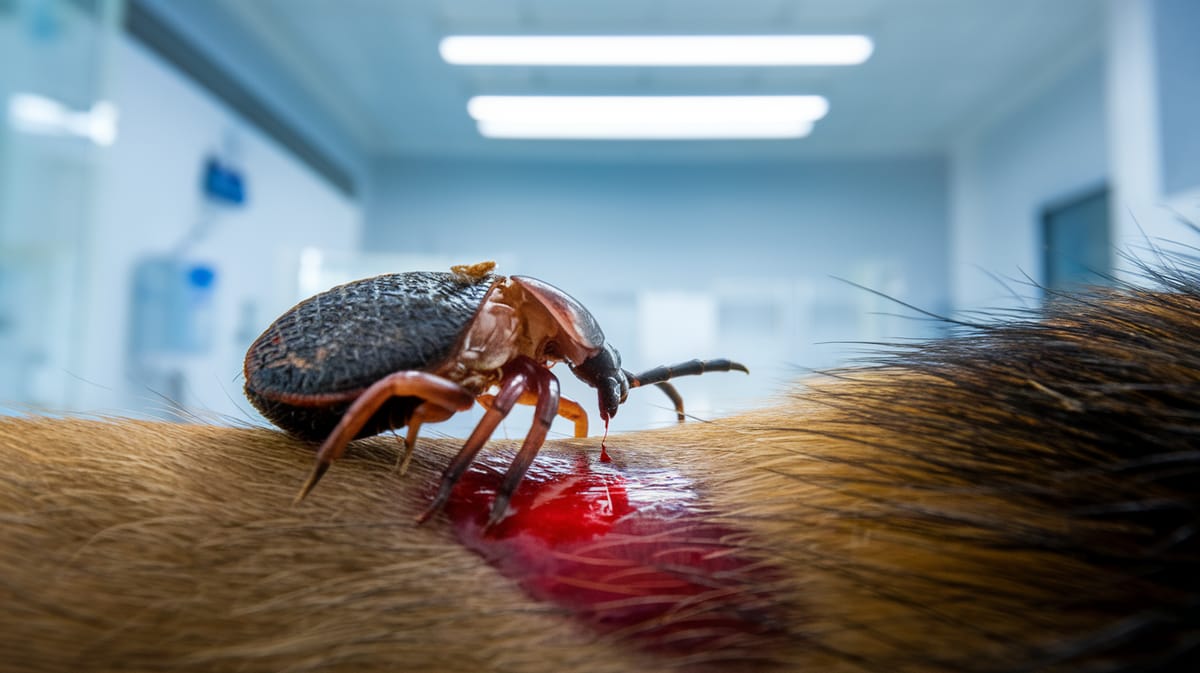Tick
Tiny yet tenacious, the tick thrives as a parasitic survivor, feeding on the blood of various hosts. This small arachnid plays a significant ecological role in controlling wildlife populations.

Key Insights at a Glance
Did You Know?
Taxonomy & Classification
Ticks are specialized arachnids with a unique ability to transmit pathogens, thriving as ectoparasites on diverse hosts. Let's understand the evolutionary journey and classification of these remarkable parasites.
Species Diversity
Ticks comprise about 900 species, primarily in the Ixodidae family, with a global presence, adapting to diverse climates and ecosystems.
Ancient Origins
Ticks have existed for over 100 million years, evolving alongside mammals and surviving significant extinction events by adapting to changing environments.
Lifecycle and Growth
A remarkable journey of transformation from Egg to Adult.
Egg
Ticks lay eggs in sheltered areas, with each female producing thousands that hatch into larvae.
Larva
Larvae, known as seed ticks, feed on small mammals or birds to gain nutrients for further development.
Nymph
Nymphs feed on a larger host, often humans or pets, to mature into adults.
Adult
Adults seek larger hosts to feed, mate, and lay eggs, completing the lifecycle.
Dietary Habits
Efficient feeders with specialized mouthparts, this insect targets blood from mammals, birds, and sometimes reptiles.
| DIET TYPE | DESCRIPTION |
|---|---|
| Primary Diet | Primarily feeds on the blood of mammals like deer, livestock, and humans for essential nutrients. |
| Secondary Diet | Occasionally feeds on birds and reptiles, especially when primary hosts are scarce or inaccessible. |
| Occasional | Rarely targets amphibians or other unusual hosts, adapting to local availability in specific environments. |

Behaviour and Adaptations
Discover the intriguing adaptations that enable ticks to thrive in various environments.
Host Detection
Ticks use heat and odor to locate potential hosts.
Blood Feeding
Specialized mouthparts allow efficient blood extraction from hosts.
Resilience
Ticks survive months to years without feeding.
Ecosystem Impact
Ticks play crucial roles in their ecosystems, contributing to biodiversity and ecological balance.
Disease Vector Control
Regulates host populations by transmitting pathogens, affecting biodiversity dynamics.
Food Source for Predators
Serves as prey for birds and other small animals, sustaining predator populations.
Decomposer Support
Enhances nutrient recycling by aiding in the decomposition process through host blood consumption.
Conservation Challenges
Understanding and addressing the major threats to Tick populations.
Chemical Exposure
Pesticides and herbicides reduce tick survival and disrupt ecosystems.
Habitat Fragmentation
Urban development and agriculture divide tick habitats, impacting movement and breeding.
Climate Variability
Changing temperatures and weather patterns affect tick life cycles and distribution.
Frequently Asked Questions
How long do Tick live?
Ticks can live for several months to years, depending on the species and environmental conditions. Some species can survive up to three years without a host. Their lifecycle includes four stages: egg, larva, nymph, and adult, with feeding occurring at each stage.
What do Tick eat?
Ticks feed on the blood of animals and humans. They attach themselves to a host, pierce the skin, and draw blood. This process can last several days. Ticks are most commonly found on mammals, birds, reptiles, and amphibians.
Are Tick poisonous?
Ticks themselves are not poisonous, but they can transmit diseases through their bites. These include Lyme disease, Rocky Mountain spotted fever, and other tick-borne illnesses. It is important to remove ticks promptly to reduce the risk of disease transmission.
Are Tick endangered?
Ticks are not considered endangered. They are widespread and exist in various environments worldwide. Their populations are generally stable, though changes in climate and habitat can affect local tick populations.
What do Tick symbolize?
In various cultures, ticks might symbolize persistence or irritation due to their parasitic nature. They are often seen as a reminder of the challenges of nature and the need for vigilance in preventing disease.
Do Tick bite?
Yes, ticks bite. They attach to the skin of their host, using specialized mouthparts to pierce the skin and feed on blood. Tick bites are often painless, which can allow them to go unnoticed for extended periods.
What color are Tick?
Ticks can vary in color depending on the species and life stage. They are generally reddish-brown, brown, or black. After feeding, they can appear gray or bluish as their bodies expand with blood.
Does a Tick have wings?
No, ticks do not have wings. They are arachnids, closely related to spiders and mites, and lack wings. Ticks rely on crawling to move and attach to their hosts.
What does a Tick look like?
Ticks are small, oval-shaped arachnids with eight legs. They have a hard or soft body depending on the species. Ticks are often flat when unfed but can become engorged and more rounded after feeding.
Is a Tick an insect?
No, ticks are not insects. They are arachnids, which means they are more closely related to spiders and mites. Unlike insects, ticks have eight legs and no wings or antennae.
Related Insects
Discover insects with similar characteristics to Tick - including shared habitats, diets, and taxonomic classifications
Share this profile
Help others discover Tick
